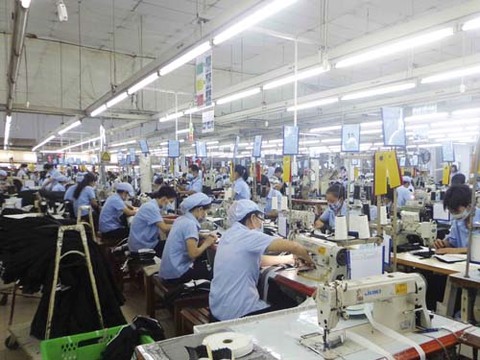
A garment production line of Viet Thang Jean in HCM City. The company is one of many Vietnamese firms facing difficulties due to the impact of the global COVID-19 pandemic. — Photo baodautu.vn
Many Vietnamese garment and textile businesses have received notices from their US and EU partners that they will temporarily stop receiving goods for three weeks to one month.
According to Pham Xuan Hong, Chairman of the HCM City Association of Garment Textile Embroidery and Knitting, customers said they needed to stop receiving goods due to the rapid spread of COVID-19 in the US and EU, prompting governments to declare states of emergency and tighten border controls.
“They asked Vietnamese businesses to suspend orders, including those being transported until borders are reopened,” Hong said.
He said the US and EU are two important textile export markets of Viet Nam. Half of all textile exports from HCM City go to the US, while the EU accounts for 15-18 per cent of annual exports.
“Partners in these markets announced the suspension of receiving goods, meaning that nearly two-thirds of the market of textiles and garments narrowed,” Hong added.
Chairman of Viet Thang Jean Co., Ltd Pham Van Viet, said evidence from China can be used to estimate that it will take at least two months in the US and EU to control the pandemic. When life becomes stable and the retail industry restarts, import businesses will reopen warehouses and import goods for distribution.
As for Viet Thang Jean, Viet said the US accounts for 30-35 per cent and the EU for 20 per cent of the company's total export turnover.
“Our products are seasonal fashion products. Imported materials were prepared six months ago. At this time when the partners announced that they would stop imports, meaning all the materials prepared for sale this summer must move to next year, making them unfashionable. About 40 per cent of existing fabrics will be abandoned or sold at low prices,” he said.
In addition, Viet said suddenly stopping imports forced enterprises to store many containers of products which were on the way to US and EU ports.
“This makes businesses spend a lot of additional expenses, while its cash flow is ‘frozen’.”
He said the most urgent problem for textile enterprises is not the delivery of orders but how to protect workers.
"Textiles is one of the industries using the highest number of workers, most of them are unable to switch to other jobs in the current situation. Therefore, maintaining employment and income for workers is not only a vital business problem but also a great impact on society,” Viet said.
“If enterprises let workers go, where will hundreds of thousands of workers go? What will businesses do to recruit workers to recover production when the pandemic is controlled? Such questions are not yet answered," Viet added.
Textile enterprises have proposed the Government quickly disburse approved economic stimulus packages, and consider partial use of the unemployment insurance fund and social insurance fund to help businesses continue paying their workers.
They also hope the Ministry of Finance and the banking system will lower interest rates or give interest-free loans, which could be used to pay workers until production activities and trade return to normal.
Embassy support
Ambassador of Viet Nam to US Ha Kim Ngoc said the US government has not announced a policy to suspend imports of Vietnamese garment and textile products.
Ngoc said the embassy has spoken with the relevant American agencies to dismiss false rumours that the US had suspended imports of Viet Nam’s garment and textile products.
He said due to the complex developments of the COVID-19 pandemic, a decline in trade activities, including the textile sector, was inevitable.
“In order to comply with the US government’s direction to the prevention of COVID-19, many businesses and large retailers such as Macy's, TJ Maxx, Walmart and Target have announced temporary closure or reduction of the opening time of stores until the end of this month,” Ngoc said.
“With the economy facing more difficulties, decreased purchasing demand of US consumers will also affect the import of products. Therefore, if the pandemic lasts for a long time, our exports of goods will be affected,” he added.
In this difficult context, Ngoc said that businesses need to be very calm while continuing to take every opportunity to maintain production and exports.
The US is a large market for Viet Nam’s garment and textile industry. In 2019, the country’s export to the US reached nearly US$15 billion, about 45 per cent of total garment and textile export turnover.
In the first two months of this year, garment and textile exports to the US hit $2.25 billion, up 5.3 per cent year-on-year, accounting for nearly 48 per cent of the country's total textile export value.
Ngoc said the embassy will continue to discuss with local authorities to support Vietnamese businesses.
“When the COVID-19 pandemic is controlled, the market demand will recover and this will be a good opportunity for Vietnamese businesses to boost exports to foreign countries, including the US,” he said. — VNS